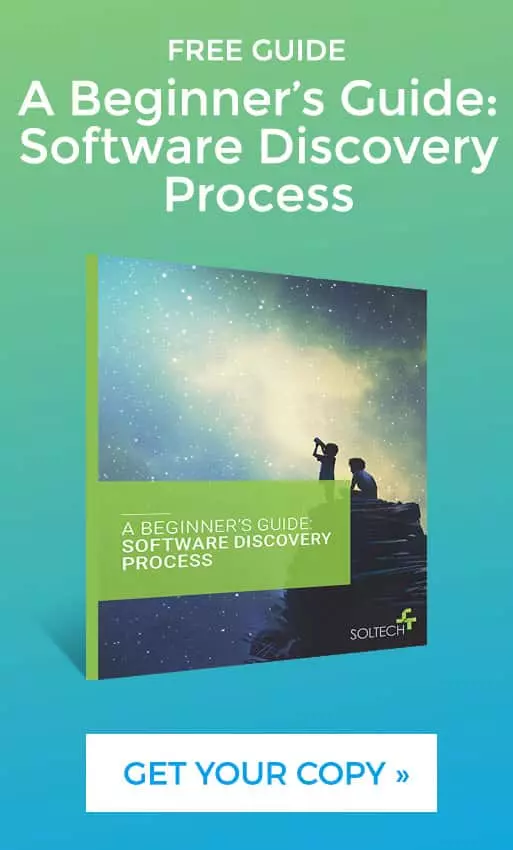
Pros and Cons of Custom Software Application Development
By SOLTECH
To build or not to build. That is the question many businesses face when they need new software. Building offers the benefit of having tailor-made software and customized solutions for your business and workplace needs.
But custom software development isn’t for everyone. The time and capital investment can be too much for many businesses, especially those that need a solution that can be up and running quickly.
If you are considering a custom software application but are on the fence, this article is for you. We have listed below the typical advantages and disadvantages of customized software to help you in your decision-making process.
What Are the Alternatives to Custom Software Applications?
Some businesses might benefit from choosing a less intensive off-the-shelf alternative, such as a platform solution or turnkey software product, that offers some level of flexibility with a more affordable price tag.
Opting for an off-the-shelf software solution often suits businesses seeking immediate implementation and cost efficiency. These ready-made solutions typically provide a range of standard features that can cater to common business requirements. They also offer quicker deployment times and lower initial costs compared to custom development.
However, for businesses with unique processes or specific needs that standard software can’t address effectively, custom software becomes a viable consideration.
What Do We Mean by Custom Software?
Custom software applications are tailored software solutions that are designed and developed to meet the specific needs and challenges of a particular business or organization. Compared to off-the-shelf software, which offers a one-size-fits-all approach with more general features, custom software rarely includes generalized features.
This bespoke approach ensures that every aspect of the software, from its functionality and interface to its scalability and integration capabilities, is tailored to support and enhance your unique business operations, offering a level of customization and efficiency that generic software solutions cannot match.
Advantages of A Custom Software Application
Building custom software applications can be daunting, but there’s a reason many businesses still choose this route. Off-the-shelf solutions can be restrictive and may not be relevant to your specific business processes.
Here are some advantages of custom software development:
- You can build exactly what you want and need.
- You have full control over the software.
- You can change the software as your business changes.
- You can start with a prototype and grow the software as your revenues grow.
- You can leverage open-source or paid platforms, tools, plugins, etc. to speed up development
- Your software will never be dropped or become unsupported.
- It can differentiate your business, giving you a competitive edge.
- You can license it to others and generate more revenue.
- There are no ongoing subscription or maintenance contracts.
Bespoke software can be tailored to the needs of your business. While it may come with more upfront costs and time investment, it can benefit your business in the long run. It will streamline your processes and be easily scaled and managed as your company grows.
Disadvantages Of A Custom Software Application
As we said, building bespoke software isn’t for everyone. It can be costly and take time to build. There are a few disadvantages of customization that you should keep in mind when making a decision:
- Custom software can be more expensive than prepackaged software. It depends if your purchased software requires an implementation or not (think SAP).
- You will need to monitor and maintain your custom application. Some applications need little to no maintenance while others can need a lot. It depends on the complexity of the software and how well it was coded.
- Custom software takes weeks or months to build.
- Technologies change over time. You may have to rewrite your software if your technology becomes obsolete.
The best way to decide if custom software is right for you is to check the existing software products. If you can find a software package that meets your needs, then this cost-saving solution may be the best way to go. Your business can benefit from a shelf product and time savings. We recommend following the 80/20 rule in your decision-making; if a pre-made software or platform is capable of supporting 80% of your needs, then opting for a custom solution may not be warranted.
Is Custom Software Right for You?
Custom software applications are ideal for unique needs unmet by existing solutions or when launching a new market product. The benefits of custom software development include lower ongoing costs, unlimited design and functionality, marketability, and proprietary value for business sales. This approach grants unparalleled flexibility and control, making it a strategic asset.
Custom software applications are particularly beneficial for long-term uses and critical needs, rather than short-term or one-off projects. If you can’t find an existing solution that works for you, or if you want to differentiate your business, then custom software may be your best choice.
Making the Right Choice with SOLTECH
If you’ve decided that the benefits of custom software development are too great to ignore, it’s time to define your vision.
Before you start developing your software app, your thoughts and ideas should be clarified and written down so they can be easily shared and understood. To help you get started on the right foot, we have created a checklist.
You can grab a copy of the checklist below and share it with your team!
Another important decision you’ll have to make is if you’ll be building software on your own or working with a development company. At SOLTECH, we know there’s no one-size-fits-all software solution for businesses. Our custom software application development services ensure you develop software products tailored to your business processes.
Learn more about our custom software development services today.
Frequently Asked Questions
What are the advantages of choosing custom software development for my business?
Custom software offers tailor-made solutions specific to your business needs. It allows full control and flexibility to adapt as your business evolves, as well as the potential to start with a prototype and scale alongside your revenue growth.
Is custom software more costly than off-the-shelf solutions?
The initial development of custom software can be more expensive than an off-the-shelf solution, but you will likely save money in the long term by avoiding ongoing subscription fees and changing or adding products as your business needs change.
How does custom software give my business a competitive edge?
Custom software differentiates your business, offering unique solutions that stand out in the market of companies with generic, off-the-shelf software solutions.
What considerations should I make before deciding between custom software and off-the-shelf solutions?
Consider your budget, timeline, the complexity of your business processes, and whether existing software meets your needs.
How do SOLTECH’s custom software application development services cater to businesses with unique processes?
SOLTECH creates software that is specifically tailored to unique business processes, ensuring a more efficient, scalable solution that aligns with specific business needs and goals.





